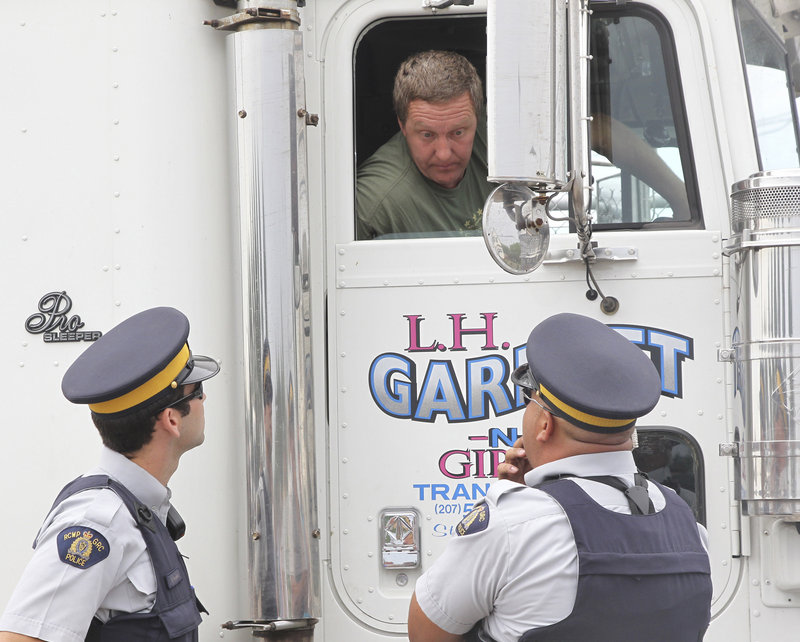Maine and Canadian officials scrambled Friday to avert a border war over low-priced lobster, hoping a long holiday weekend in New Brunswick could help to defuse the tension.
Patrick Keliher, commissioner of Maine’s Department of Marine Resources, said he talked with Michael Olscamp, Canada’s minister of fisheries and agriculture, throughout Friday about protests by Canadian fishermen over shipments of Maine lobsters to Canada.
On Thursday, a truck driver carrying lobsters from Maine was detained for six hours in a protest by about 200 Canadian fishermen, who are upset that Maine lobster shipments are driving down prices at processing plants just before their fishing grounds reopen for lobstering.
“We’re closing in on a resolution,” Keliher said late Friday, with Canadian processors trying to reach a deal to offer a minimum price to lobstermen when the Northumberland Strait opens to them Aug. 9.
Keliher said the plants will be closed Monday, which is New Brunswick Day, so officials will have a little more time to work out a solution and avoid a repeat of Thursday, when the protests prompted three processing plants to shut down.
Maine lobstermen have been dealing with low prices for their catch all summer, since a glut of soft-shell lobsters flooded the market early in the season. Many have pinned their hopes on the Canadian processing plans to push prices higher.
Keliher said, “We were starting to see some upticks in the price for Maine lobster, but this situation caused it to slow down.”
Keliher noted that lobstermen in Maine — who have been getting well under $3 a pound — are starting to catch lobsters with harder shells.
Canadian processing plants are the most attractive out-of-state market for soft-shell lobsters because those lobsters can’t survive longer trips. Hard-shell lobsters can handle shipping better, so they can be sold live farther down the East Coast, broadening the market and most likely boosting prices.
Keliher said Olscamp couldn’t guarantee a deal between processors and lobstermen. Even with a deal, Keliher said, Olscamp worries that “a few, as he called them, ‘rogue fishermen’ may try to continue the protests.”
When a protest broke out Thursday in Shediac, New Brunswick, Leonard Garnett of Steuben, Maine, drove into an international incident — hauling 37,000 pounds of live lobster.
Garnett pulled into the loading dock of the Shediac Bay Processing Co. and climbed into the sleeper portion of his cab while waiting for plant workers to begin unloading his lobster.
“I heard some hollering going on and there was a crowd of people standing the roadway,” said Garnett, who owns L.H. Garnett Trucking and spoke Friday as he drove back to Maine. “They was hollering, ‘Shut the truck off!’ and ‘Shut the plant down!’ They was hollering all kinds of stuff.”
Garnett said a plant worker warned him that the protesters might try to shut off the refrigeration unit on his trailer to spoil the lobster, then five or six protesters approached his truck.
“They were talking in French, so I didn’t understand a word they were saying, but they were pointing at my reefer (refrigeration unit), so I got the gist,” he said.
The group walked away without tampering with the refrigeration unit, Garnett said, then the plant owner asked him to leave to try to stop the protest.
Garnett tried to drive off, he said, but couldn’t make the turn out of the plant’s parking lot because the protesters’ pickup trucks were blocking part of the road. When he tried to back up to get a better angle on the turn, he said, the protesters gathered behind his truck, essentially locking him in place.
Garnett said some protesters started to put stickers on this truck, protesting the importation of Maine lobsters.
“We had a heated discussion over that,” he said.
Garnett got even more upset when some protesters threatened to spray-paint his trailer and others opened its rear doors, exposing the lobsters to warm air before the Royal Canadian Mounted Police closed them.
Then the protesters tampered with one of his front tires, causing the police to call in a repair truck to fix the valve and fill the tire with air, which cost Garnett $151.
Finally, the protesters told Garnett that if he left the trailer and tons of lobsters, they would let him go. “I wasn’t leaving it there,” he said, pointing out that his insurance rates would rise.
Garnett said he was never really afraid that protesters might try to hurt him, although he was adamant about protecting his trailer.
“I come from Down East Maine and I don’t think I know enough to be scared,” he said.
About a dozen of the protesters were causing most of the problems, Garnett said, and “as an overall group, they were very good people,” including one protester who kept climbing next to his window, assuring him that things would be worked out.
Garnett said he sympathizes with the protesters, having seen the problems that low prices have caused for lobstermen in Maine.
“It’s a no-win situation for either side,” he said,
Police finally forced the protesters to give Garnett room to back up and leave. He said he took the lobsters to “an undisclosed location in Nova Scotia,” where the load’s owner — who Garnett also declined to identify — had found another buyer.
Garnett said he is looking forward to a couple of days off before his next job, which should be less eventful: hauling a load of frozen blueberries, inside Maine’s borders.
Staff Writer Edward D. Murphy can be contacted at 791-6465 or at:
emurphy@pressherald.com
Send questions/comments to the editors.




Comments are no longer available on this story